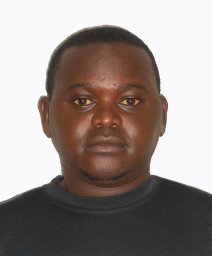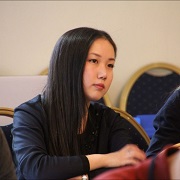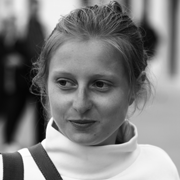Meet The Grattan Scholars
The Grattan Scholars programme is developing as an internationally recognised scholarship programme which is helping attract the best and brightest students to Trinity. Since 2012 it has grown into community of international scholars - from fourteen countries around the world.
Scholars have made a huge contribution to academic life in Trinity, as talented researchers and inspirational teachers of undergraduate students. Their research which spans issues of major global societal and economic importance — such as migration, inequality, financial globalisation and international development– is more relevant than ever as society faces wide-ranging and interlinked global challenges.
- Grattan Scholars Alumni
- 2023 Scholars
- 2022 Scholars
- 2021 Scholars
- 2020 Scholars
- 2019 Scholars
- 2018 Scholars
- 2017 Scholars
- 2016 Scholars
- 2014 Scholars
2023 Grattan Scholars
Doireann O`Brien - The Economic Consequences of Child Marriage for Girls and their Children

Doireann O’Brien is a first-year PhD candidate in Economics, working under the supervision of Professor Nicola Fontana.
She is in the early stages of the first paper of her thesis in which she hopes to investigate whether restricting access to sex-selective abortion increases the incidence of child marriage within the context of a ban in India. Doireann hopes to pursue a career in empirical research, focusing on the areas of gender and development.
2022 Grattan Scholars
Elijah Kipkech Kipchumba - Gender and Intrahousehold Inequality in Sub-Saharan Africa

Elijah’s research interests and publications are broadly related to gender and labour economics and he has many years’ experience working in development economics in Eastern Africa. As a Grattan scholar, Elijah will explore consequences of gender and intrahousehold inequality in Sub-Saharan Africa and ways of mitigating these inequalities.
Elijah has eight years’ experience working on research in development economics in Eastern Africa. He has worked as a research associate at BRAC International and Save the Children International. Elijah obtained his BSc in Applied Statistics from Maseno University and his MSc in Quantitative Economics at Makerere University.
2021 Grattan Scholars
Michael McRae - Entrepreneurship Support for Refugees and Host Communities in a Fragile Context

Michael joined the Trinity PhD programme in economics in 2021 under the supervision of Dr Carol Newman and Dr Tara Mitchel. Prior to his PhD, Michael complete an MSc in Economics at Trinity with distinction partially funded by the Global Excellence Postgraduate Scholarship. Michael obtained his B.Comm from The University of Sydney, where he undertook work as a teaching assistant in economics and statistics for 2.5 years.
2020 Grattan Scholars
Victoria Iugai - Distributed Responsibility and Free Will
 “For successful functioning, members of society must hold themselves and others responsible for their actions. But people are inclined to partially attribute their responsibility to other agents and/or specific circumstances when their freedom of choice is limited by those agents or circumstances. My research aims to create a framework explaining the concept of responsibility distributed among several agents, groups and other external factors and some practical guidelines about how responsibility can be measured. The Grattan Scholarship gives me an excellent opportunity to realize my research interests and to write a PhD dissertation at Trinity College Dublin.”
“For successful functioning, members of society must hold themselves and others responsible for their actions. But people are inclined to partially attribute their responsibility to other agents and/or specific circumstances when their freedom of choice is limited by those agents or circumstances. My research aims to create a framework explaining the concept of responsibility distributed among several agents, groups and other external factors and some practical guidelines about how responsibility can be measured. The Grattan Scholarship gives me an excellent opportunity to realize my research interests and to write a PhD dissertation at Trinity College Dublin.”
Victoria joins Trinity College Dublin as a Grattan Scholar in 2020 under the supervision of Adina Preda, Associate Professor in Philosophy. Her research on distributed responsibility is a collaboration of theoretical philosophy, practical philosophy, psychology, and legal theory.
Before joining Trinity, Victoria was a research fellow at Saint Petersburg University and an invited lecturer at National Research University Higher School of Economics in Russia. She received an MA in Philosophy at the University of Tartu in Estonia and obtained her undergraduate degree in Economics National Research University Higher School of Economics in Russia.
2019 Grattan Scholars
Arnie Trinidad – Class, Translocality, and Integration: Examining the Experiences of Filipino Migrant Nurses in Ireland
 “My PhD research utilizes a novel approach in understanding migrant class and class identities through the lens of translocality - a relatively recent development in social science research that looks at how migrants are connected to different geographical spaces such as neighbourhoods, communities, and nations. Using mixed methods research, I will look at how the translocal context of Filipino migrant nurses in Ireland shapes their lifestyle choices, life chances, and integration, among others. My first research paper will examine the changes in the socioeconomic and class status of migrants before and after their migration to Ireland.”
“My PhD research utilizes a novel approach in understanding migrant class and class identities through the lens of translocality - a relatively recent development in social science research that looks at how migrants are connected to different geographical spaces such as neighbourhoods, communities, and nations. Using mixed methods research, I will look at how the translocal context of Filipino migrant nurses in Ireland shapes their lifestyle choices, life chances, and integration, among others. My first research paper will examine the changes in the socioeconomic and class status of migrants before and after their migration to Ireland.”
Arnie joined Trinity College Dublin as a Grattan Scholar in 2019 under the supervision of Professor Daniel Faas, Department of Sociology. He taught at the University of the Philippines Diliman until 2012, managed a hospital-based Foundation, and later worked as a Program Coordinator and Senior Researcher for the Psychosocial Support and Children’s Rights Resource Center in Manila.
He has published and conducted research on migrant identity; children’s rights including child sexual exploitation, children in conflict with the law, and child participation; and mental health and psychosocial support in emergencies. His current research interest is on understanding socioeconomic and class conditions of migrant workers.
2018 Grattan Scholars
Miceal Canavan – Prejudice Reduction and the Implications for Political Behaviour
 "The politics of identity in Northern Ireland remain fraught and complex 25 years on from the Belfast agreement. Political parties and leaders continue to rely on oppositional group identities to mobilize their supporters and paramilitary organisations continue to operate in both communities. The aim of my research is to shed light on how identities are formed and shaped by the rhetoric of political leaders, and whether there is any link between this type of rhetoric and political violence. The Grattan scholarship has allowed me to expand this research beyond the Northern Irish context to understand the links between rhetoric and political violence in other post-conflict contexts and even stable western democracies."
"The politics of identity in Northern Ireland remain fraught and complex 25 years on from the Belfast agreement. Political parties and leaders continue to rely on oppositional group identities to mobilize their supporters and paramilitary organisations continue to operate in both communities. The aim of my research is to shed light on how identities are formed and shaped by the rhetoric of political leaders, and whether there is any link between this type of rhetoric and political violence. The Grattan scholarship has allowed me to expand this research beyond the Northern Irish context to understand the links between rhetoric and political violence in other post-conflict contexts and even stable western democracies."
Miceal started his PhD research in 2018 under the supervision of Dr Gizem Ariken, Assistant Professor in Political Science. Prior to his PhD, Miceal undertook an MSc in International Politics at Trinity where he achieved a distinction and was supported by the North-South Scholarship. His undergraduate degree was in Law at the University of Cambridge, however, before returning to academia at Trinity he worked for a number of years in international development based in London and South Africa.
Stefanie Sprong - Explaining the ‘Migrant Gap’ among Children in Ireland
 “In today’s increasingly diverse societies one of the key questions is how to foster the structural integration of immigrants. Education is a critical resource for economic and societal progress and a crucial factor structuring socio-economic outcomes and life chances of individuals. The Grattan Scholarship gives me an outstanding opportunity to further develop and challenge myself whilst adding to the limited knowledge on this topic of high societal relevance.”
“In today’s increasingly diverse societies one of the key questions is how to foster the structural integration of immigrants. Education is a critical resource for economic and societal progress and a crucial factor structuring socio-economic outcomes and life chances of individuals. The Grattan Scholarship gives me an outstanding opportunity to further develop and challenge myself whilst adding to the limited knowledge on this topic of high societal relevance.”
Stefanie Sprong is a IRC Grattan Scholar in the Department of Sociology at Trinity College Dublin. Her primary research interests lie in the field of interdisciplinary and comparative studies of the integration of immigrants and their descendants. She also takes an interest in the field of prejudice and intergroup relations.
In her PhD project, Stefanie examines the school performance of children with a migration background from a comparative and longitudinal perspective. She is supervised by Richard Layte, Professor of Sociology, and Jan Skopek, Assistant Professor in the Department of Sociology.
Before joining Trinity as a Grattan Scholar, Stefanie completed an MSc in Migration, Ethnic Relations and Multiculturalism at Utrecht University, at the top of her class. She also holds a BA in Liberal Arts and Sciences from University College Utrecht. In addition, she has been involved in several research projects related to labour market discrimination, multiculturalism and economic inequality.
2017 Grattan Scholars
Stefano Ceolotto - The Influence of Moral Licensing and Magnitude Effect on Pro-Environmental Behaviours
"For my first paper, I am investigating how moral licensing affects pro-environmental behaviours. The Grattan Scholarship gave me the possibility to study this phenomenon through a lab experiment involving hundreds of participants. This kind of experiment, and of this size, allows me to conduct a much more structured and robust research, thus leading to more reliable results, and it would never have been possible without the support of the Grattan Scholarship."
 Stefano joined Trinity as a Grattan Scholar in 2017, to undertake research in the field of energy and environmental economics under the supervision of Eleanor Denny, Associate Professor in Economics. His research will analyse whether doing a pro-environmental deed makes individuals less inclined to engage in subsequent pro-environmental behaviours.
Stefano joined Trinity as a Grattan Scholar in 2017, to undertake research in the field of energy and environmental economics under the supervision of Eleanor Denny, Associate Professor in Economics. His research will analyse whether doing a pro-environmental deed makes individuals less inclined to engage in subsequent pro-environmental behaviours.
Stefano completed a Masters in Economics at Ca' Foscari University of Venice and spent six months at the University of Copenhagen as visiting student. Before that, he obtained a Bachelors Degree in Foreign Trade at Ca' Foscari University. Prior to his arrival at Trinity, Stefano was also a Teaching Assistant in Microeconomics for undergraduate students and Ca' Foscari University.
Friedrich Kreuser - The Role and Transmission of Technology in the Economy
 Friedrich joined the Economics PhD programme to undertake research into the role and transmission of technology in the economy under supervision of Professor Carol Newman. Technology here is an encompassing term including machinery, software, and the internet as well as management styles, worker skills and even corporate structure. His first paper is on the role of firm level training programmes on worker embodied technological spill-overs in the context developing countries.
Friedrich joined the Economics PhD programme to undertake research into the role and transmission of technology in the economy under supervision of Professor Carol Newman. Technology here is an encompassing term including machinery, software, and the internet as well as management styles, worker skills and even corporate structure. His first paper is on the role of firm level training programmes on worker embodied technological spill-overs in the context developing countries.
Before joining Trinity as a Grattan Scholar, Friedrich obtained a MSc in Economics at the London School of Economics and Political Sciences through a Commonwealth Scholarship. In addition, he holds a Masters in Economics from Stellenbosch University where he also received his undergraduate degree in Commerce and Law.
2016 Grattan Scholars
Elisa Maria Tirindelli - The Economics of City Regrowth
"My research aims to investigate broadly the dynamics of city size and their hierarchies. I am using a unique dataset on city size in Great Britain and Ireland and I am observing their dynamics over a hundred years. This has allowed me draw a model of city hierarchies behaviour that has the aim of helping us to understand how bigger cities become increasingly bigger."
 Elisa joined Trinity's PhD in Economics programme to undertake research in urban development from a historical perspective, with a focus on Dublin. Her research, which is being supervised by Ronan Lyons, Assistant Professor in Economics, will explore the distribution of cities within countries, Ireland in particular, and on the within cities dynamics, with a focus on Dublin.
Elisa joined Trinity's PhD in Economics programme to undertake research in urban development from a historical perspective, with a focus on Dublin. Her research, which is being supervised by Ronan Lyons, Assistant Professor in Economics, will explore the distribution of cities within countries, Ireland in particular, and on the within cities dynamics, with a focus on Dublin.
Before joining Trinity as a Grattan Scholar, Elisa undertook a joint Masters in Mathematical Economics between Paris I and Paris School of Economics and obtained her undergraduate degree in Economics at Bocconi University in Milan.
2014 Grattan Scholars
-
Purnima Kanther - Financial and Political Behaviour in Developing Countries
“The Grattan Scholarship has enabled me to undertake field work in India to develop the focus of my second PhD paper. In this research I am examining voter behaviour and government responses based on the visibility of public good provision in India.” 
Purnima joined Trinity as a Grattan Scholar in 2014 and is researching 'Financial and Political Behavioural in Developing Countries’ under the supervision of Michael King, Assistant Professor in the Department of Economics. In her first paper, she examined short term behavioural changes as a pre-requisite for success of a financial inclusion scheme such as PMJDY in India. Her second paper explores democratic accountability. Purnima also lectures on the Introduction to Economic Policy module for first-year undergraduate students.
Purnima received an MSc in Economics from the University of Leicester in 2011 where she was awarded the best economics student award. Prior to her PhD, she worked as a Research Assistant at Euromoney Institutional Investors, London and as a Research Associate at CAFRAL, Reserve Bank of India, Mumbai.

